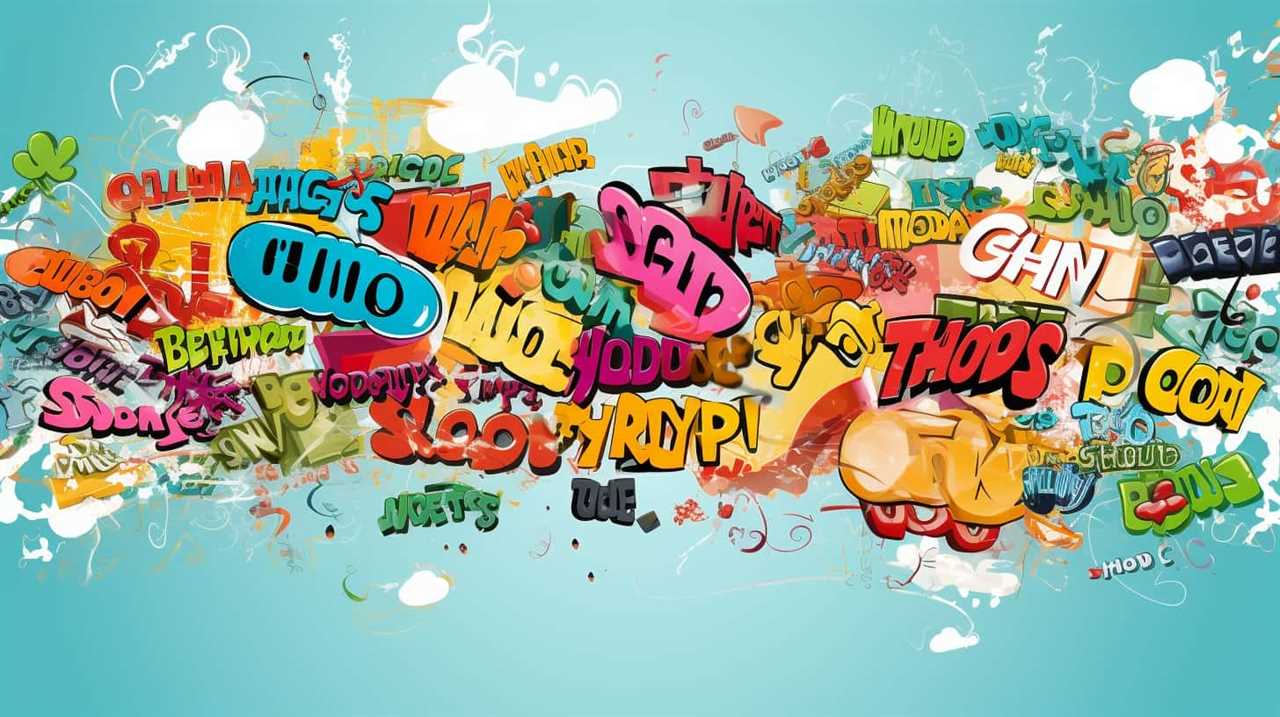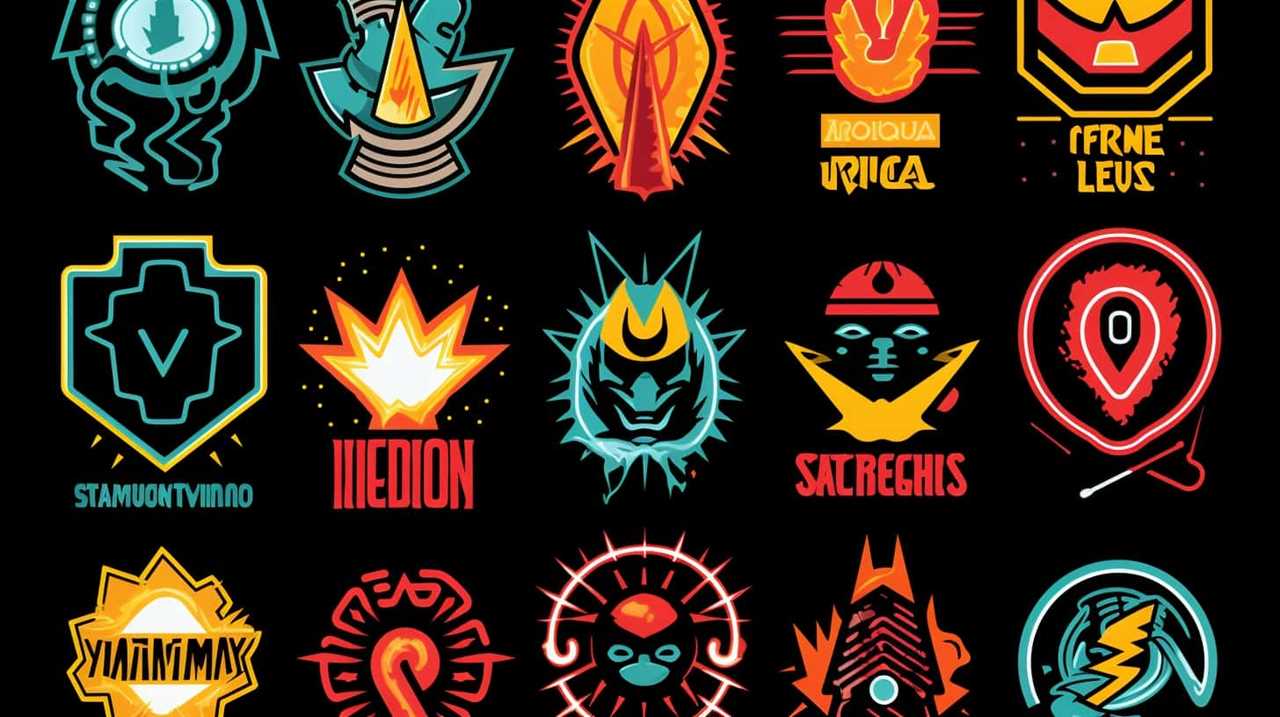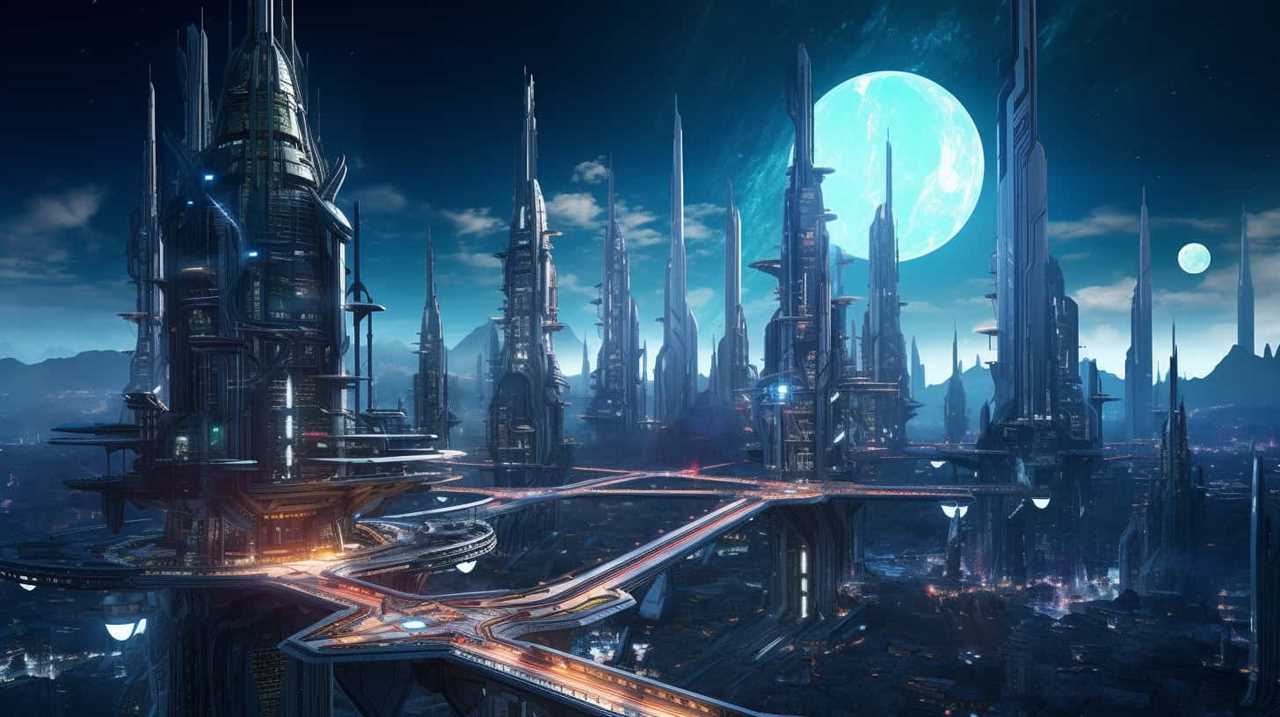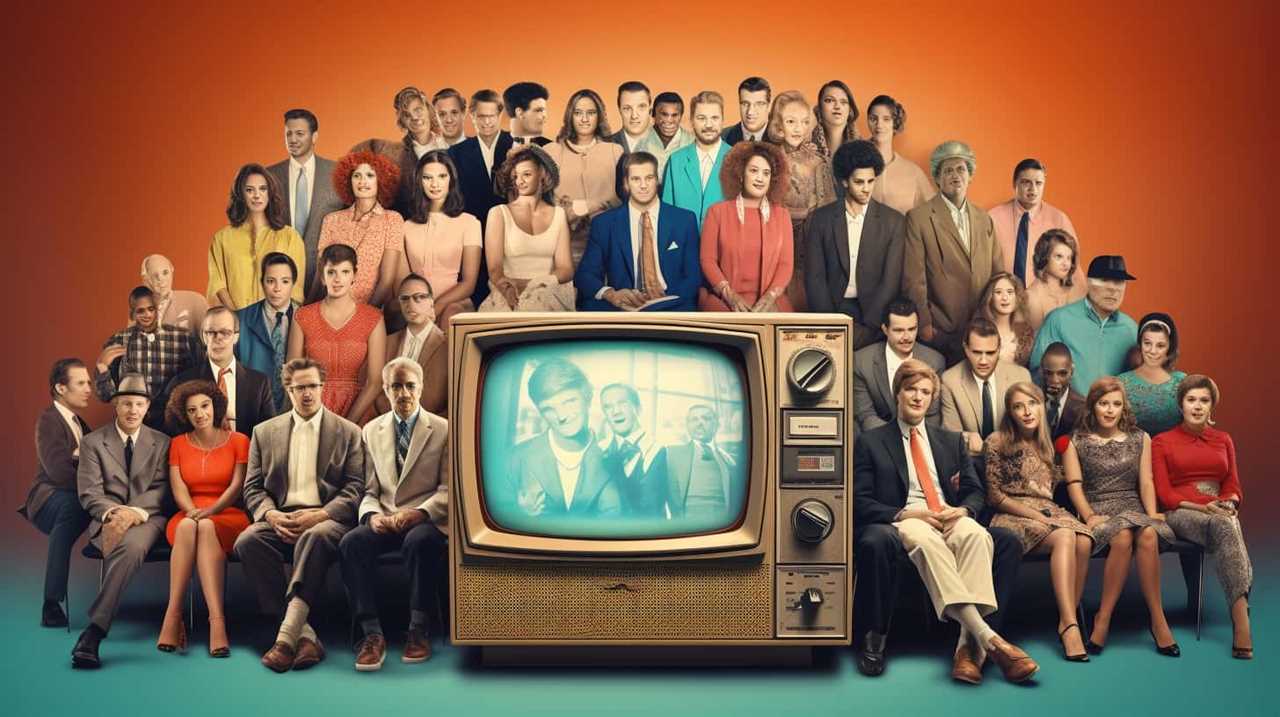Ever thought about why sci-fi shows frequently present us with moral dilemmas? It might appear unnecessary or even unappealing to some, but there’s a significant rationale behind this intentional decision.
Sci-fi series, with their futuristic settings and imaginative storylines, have the power to ignite our minds and push the boundaries of conventional thinking. They challenge us to explore ethical complexities and confront our own values and beliefs.
By presenting us with moral quandaries, these shows not only entertain us, but also provoke us to question the very essence of what it means to be human.
In this introduction, we will delve into the reasons why sci-fi series boldly tackle morality, and how they can inspire us to contemplate the future of our own humanity.

Key Takeaways
- Sci-fi series confront us with morality by presenting ethical dilemmas that challenge our values and beliefs.
- They explore moral ambiguity, blurring the line between good and evil, and forcing us to question our own moral compass.
- Science fiction prompts us to reflect on our own values and ethical responsibilities as individuals and as a society.
- It pushes the boundaries of what is considered morally acceptable and encourages us to imagine new possibilities in terms of ethics and morality.
Ethical Dilemmas Explored in Sci-Fi
We are often confronted with a multitude of ethical dilemmas when exploring the world of science fiction. Sci-fi ethics is a fascinating subject that delves into the moral implications of the imaginative worlds created within the genre. One of the reasons why ethical dilemmas are prevalent in science fiction is because it allows us to examine complex moral issues in a safe and detached manner. By presenting these dilemmas in a fictional context, we can explore the consequences of our actions without directly impacting the real world.
Ethical dilemmas in fiction often force us to question our values and beliefs. They challenge us to consider the consequences of our choices and actions, and to reflect on what it means to be human. These dilemmas can range from the moral implications of advanced technology and artificial intelligence to the ethics of space exploration and colonization. In exploring these ethical dilemmas, science fiction encourages us to think critically about the potential consequences of our actions and the impact they may have on society and the world at large.
One of the key strengths of science fiction is its ability to present us with scenarios that are far removed from our own reality. This allows us to explore ethical dilemmas in a way that’s imaginative and thought-provoking. By presenting us with alternative worlds and societies, science fiction challenges our preconceived notions of right and wrong, and pushes us to consider new perspectives and possibilities. In doing so, it encourages innovation and pushes the boundaries of what’s considered ethically acceptable.
Moral Ambiguity in Sci-Fi Series
While exploring the world of science fiction, one can’t help but be confronted with the moral ambiguity that’s often present in sci-fi series. This exploration of moral ambiguity is a key aspect of many popular sci-fi shows, as it forces viewers to grapple with complex ethical decision-making and challenges conventional notions of right and wrong.

Sci-fi series often present scenarios where characters are faced with difficult choices that blur the line between good and evil. These situations force viewers to question their own moral compass and consider the consequences of their actions. By exploring moral ambiguity, sci-fi series push us to examine the gray areas of ethical decision-making, rather than relying on simplistic black-and-white judgments.
One reason for the prevalence of moral ambiguity in sci-fi series is its ability to reflect the complexity of the real world. In our everyday lives, we often find ourselves confronted with situations that don’t have clear-cut solutions. Sci-fi series, with their futuristic settings and imaginative storylines, provide a platform for exploring these moral dilemmas in a more exaggerated and thought-provoking manner.
Furthermore, by presenting characters who are morally ambiguous, sci-fi series challenge traditional notions of heroism and villainy. This allows for a more nuanced portrayal of characters and encourages viewers to question their preconceived notions of good and evil. It forces us to consider the motivations and circumstances that lead individuals to make morally questionable choices.
The Role of Morality in Science Fiction
When exploring the role of morality in science fiction, we’re confronted with a multitude of moral dilemmas and ethical implications.

Science fiction often presents us with complex scenarios that challenge our beliefs and force us to question the boundaries of right and wrong. These stories allow us to examine the consequences of our actions and contemplate the moral implications of technological advancements.
In doing so, science fiction prompts us to reflect on our own values and ethical responsibilities as individuals and as a society.
Moral Dilemmas in Sci-Fi
One of the most intriguing aspects of science fiction is its exploration of moral dilemmas that challenge our beliefs and values in a thought-provoking manner. In the world of science fiction, these moral dilemmas often arise from the ethical implications of advanced technology, alien encounters, and dystopian societies.
Here are five examples of moral dilemmas in sci-fi:

- The trolley problem: What if you’d to choose between sacrificing one life to save many?
- The Prime Directive: Should we interfere with less advanced civilizations or let them evolve naturally?
- Artificial intelligence: Is it ethical to create intelligent beings and treat them as slaves?
- Genetic engineering: Should we modify our DNA to eradicate diseases, even if it means altering what it means to be human?
- Time travel paradoxes: Is it morally right to change the past, even if it has negative consequences for the future?
These moral dilemmas force us to question our own values and confront the complexities of our choices. Science fiction provides a unique platform for exploring these ethical quandaries, challenging us to think beyond the boundaries of our current understanding and imagine new possibilities.
Ethical Implications in SF
In exploring ethical implications in science fiction, we’re confronted with the role of morality in these imaginative narratives. Science fiction often presents us with scenarios that push the boundaries of what’s considered morally acceptable in our society. It challenges us to question our values, beliefs, and perceptions of right and wrong.
One of the key aspects of ethical implications in science fiction is the exploration of moral ambiguity. These stories present us with complex characters and situations where the lines between good and evil are blurred. They force us to confront our own biases and preconceived notions, forcing us to reevaluate our understanding of morality.
Ethical Questions Raised by Sci-Fi TV Shows
As viewers, we’re often confronted with moral dilemmas in sci-fi TV shows that challenge our ethical beliefs and values. These shows present us with futuristic scenarios and technologies that force us to question the implications and consequences of our actions.

Moral Dilemmas in Sci-Fi
We are often confronted with moral dilemmas and ethical questions when watching sci-fi TV shows. These thought-provoking narratives explore the intricacies of ethical decision making and present us with moral complexity that challenges our preconceived notions.
Here are five ways in which sci-fi TV shows raise moral dilemmas:
- Artificial intelligence: Shows like ‘Westworld’ and ‘Black Mirror’ question the morality of creating sentient beings and explore the rights and treatment of artificial intelligence.
- Time travel: Series like ‘Doctor Who’ and ‘Dark’ delve into the ethical consequences of altering the past and the potential harm it can cause.
- Human experimentation: ‘Stranger Things’ and ‘Fringe’ tackle the ethical implications of experimenting on humans, blurring the line between scientific progress and human rights.
- Alien encounters: Shows like ‘The Expanse’ and ‘The X-Files’ examine the moral dilemmas that arise when humans interact with extraterrestrial life and the ethical responsibilities that come with it.
- Socio-political commentary: Sci-fi shows like ‘Black Mirror’ and ‘The Handmaid’s Tale’ use futuristic settings to critique current societal norms and challenge our moral compass.
Through these moral dilemmas, sci-fi TV shows prompt us to reflect on our own values and beliefs, pushing the boundaries of imagination and innovation.
Ethical Implications of Sci-Fi
Exploring the ethical implications of sci-fi TV shows, we’re prompted to question the moral complexities raised by these narratives. Sci-fi series often delve into futuristic worlds, advanced technologies, and complex societies. As viewers, we’re presented with scenarios that challenge our understanding of ethical decision making and moral responsibility.

One of the key aspects of sci-fi shows is the exploration of the human condition and the choices individuals make in extraordinary circumstances. These narratives often push the boundaries of what’s considered morally acceptable, forcing us to question our own beliefs and values. By presenting us with morally ambiguous characters and situations, sci-fi TV shows provide a platform for discussing important ethical questions.
For example, in shows like ‘Black Mirror,’ we’re confronted with the consequences of technological advancements and the moral dilemmas they pose. Do we have a moral responsibility to control the use of technology? What are the ethical implications of creating artificial intelligence that can experience emotions? These thought-provoking questions challenge us to consider the potential impact of our actions on society and the world at large.
Furthermore, sci-fi TV shows often tackle issues of social justice and inequality. They raise questions about the moral responsibility of individuals and societies to address these issues. For instance, in ‘The Expanse,’ we’re confronted with a future where humanity has colonized other planets, but the distribution of resources and power remains unequal. These narratives force us to reflect on our own role in shaping a more just and equitable society.
The Ethical Impact of Sci-Fi Storylines
Through the exploration of complex and thought-provoking scenarios, sci-fi series immerse us in ethical dilemmas that challenge our perspectives and push us to reflect on our own moral compass. These storylines have a profound impact on our ethical decision-making process, forcing us to confront philosophical implications that we may not have considered before.

Here are five ways in which sci-fi storylines have an ethical impact:
- Moral Relativism: Sci-fi series often present us with alien cultures and civilizations that have vastly different moral codes and values. This challenges our own belief in the universality of ethical principles and forces us to question whether there are objective moral truths.
- Technological Ethics: Sci-fi often explores the ethical implications of advanced technologies such as artificial intelligence, genetic engineering, and virtual reality. These storylines force us to consider the ethical boundaries of scientific progress and the potential consequences of our actions.
- Social Justice: Many sci-fi series tackle issues of inequality, discrimination, and social injustice. By presenting us with dystopian futures or alternate realities, these storylines shed light on the ethical implications of our current societal structures and inspire us to strive for a more just and equitable world.
- Environmental Ethics: Sci-fi often depicts the consequences of environmental destruction and explores the ethical responsibilities humans have towards the planet. These storylines challenge us to reevaluate our relationship with the environment and consider the long-term implications of our actions.
- Ethics of Power: Sci-fi frequently explores the ethical dilemmas that arise from the possession of extraordinary powers or advanced technologies. These storylines force us to consider the responsibilities that come with power and the potential for abuse or misuse.
Exploring Moral Choices in Sci-Fi Television
In many sci-fi television series, characters are faced with a multitude of moral choices that challenge our understanding of right and wrong. These ethical decision-making moments add a layer of complexity to the storytelling, forcing viewers to contemplate the consequences of various actions and question their own moral compass.
Sci-fi series often delve into intricate moral dilemmas that push the boundaries of our imagination and force us to confront our own beliefs and values.
One of the reasons why moral choices are so prevalent in sci-fi television is because they provide a platform for exploring moral complexity. By presenting characters with difficult decisions, these shows allow us to delve into the grey areas of morality, where the lines between right and wrong become blurred. This exploration offers a nuanced perspective on ethical decision-making, challenging us to consider the consequences of our actions in a world that’s vastly different from our own.

As we explore the moral choices presented in sci-fi television, we begin to see a pattern emerge – morality is a central theme in these series. The exploration of ethical decision-making and moral complexity not only adds depth to the storytelling, but also prompts us to reflect on our own moral values and the world we live in.
Morality as a Central Theme in Sci-Fi Series
By delving into the complexities of moral decision-making, sci-fi series challenge our beliefs and values, prompting us to reassess our understanding of right and wrong. Through their thought-provoking narratives and futuristic settings, these series tackle ethical decision-making and explore the moral complexity of human existence.
Here are five reasons why morality serves as a central theme in sci-fi series:
- Exploring the consequences of technology: Sci-fi series often depict advancements in technology that present new ethical dilemmas. From artificial intelligence to genetic engineering, these shows raise questions about the moral implications of these innovations.
- Examining the nature of good and evil: By presenting morally ambiguous characters and complex ethical situations, sci-fi series encourage us to question our preconceived notions of good and evil. They challenge us to consider the motivations behind our actions and the potential for redemption.
- Reflecting societal concerns: Many sci-fi series serve as allegories for real-world issues, addressing social, political, and environmental concerns. By exploring these themes through a futuristic lens, they force us to confront our own moral responsibilities in the present.
- Encouraging empathy and understanding: Sci-fi series often introduce us to alien species or futuristic societies with different belief systems. By immersing us in these diverse worlds, they foster empathy and encourage us to consider alternative perspectives.
- Provoking ethical discussions: The moral complexity presented in sci-fi series stimulates conversations about right and wrong, sparking ethical debates among viewers.
As we delve further into the ethical challenges presented in futuristic TV dramas, we’ll explore how these series push the boundaries of our moral understanding and confront us with complex ethical dilemmas.

Ethical Challenges in Futuristic TV Dramas
As viewers engage with futuristic TV dramas, they’re confronted with a multitude of ethical challenges that test our moral compass and force us to question our own values and beliefs. These dramas present us with scenarios that push the boundaries of what’s morally acceptable, forcing us to grapple with the ethical implications of the choices made by the characters.
One of the key aspects of these dramas is their ability to explore moral complexity. They present us with situations where there are no clear-cut answers or easy solutions. Instead, we’re confronted with dilemmas that require careful consideration and reflection. These ethical challenges force us to confront our own biases and preconceived notions, as we’re forced to evaluate the actions and decisions of the characters from different perspectives.
Furthermore, the futuristic settings of these TV dramas allow for a deeper exploration of ethical implications. By presenting us with a world that’s vastly different from our own, these shows allow us to examine the consequences of our actions in a new light. They challenge us to think critically about the choices we make and the impact they’ve on society as a whole.
The Moral Lessons of Science Fiction TV
Science fiction TV series challenge our moral compass and provoke thoughtful reflection on the ethical lessons they convey. These shows offer more than just entertainment; they serve as a medium through which we can explore the ethical implications of our actions and the moral choices we make.

Here are five key ways in which science fiction TV teaches us valuable moral lessons:
- Exploring the consequences of technology: Science fiction often delves into the ethical implications of technological advancements, forcing us to question the potential consequences and responsibilities that come with scientific progress.
- Examining the nature of humanity: By presenting us with alien species and artificial intelligence, science fiction prompts us to reflect on what it means to be human and the moral obligations we’ve towards other beings.
- Challenging societal norms: Through futuristic societies and alternative realities, science fiction pushes us to question the status quo and consider the ethical consequences of our social structures and norms.
- Highlighting the importance of empathy: Many science fiction TV series emphasize the value of empathy and understanding, reminding us of the moral choices we can make to create a more compassionate and inclusive society.
- Tackling ethical dilemmas: Science fiction often presents characters with complex moral dilemmas, forcing us to confront our own beliefs and values and consider the difficult choices we might face in the future.
Frequently Asked Questions
How Do Sci-Fi Series Explore and Portray Ethical Dilemmas?
Sci-fi series explore and portray ethical dilemmas by presenting futuristic scenarios that challenge our understanding of right and wrong. They force us to confront moral quandaries and consider the ethical implications of our choices.
What Are Some Examples of Morally Ambiguous Characters or Situations in Sci-Fi Series?
In sci-fi series, morally ambiguous characters and situations are prevalent, presenting ethical dilemmas that challenge our own values. They provoke thought and exploration into the complexity of human behavior and the choices we make.
How Does Morality Play a Role in Shaping the Narrative and Themes of Science Fiction?
Ethical decision making and morality in futuristic societies shape the narrative and themes of science fiction. By exploring complex moral dilemmas, sci-fi series challenge and provoke us to think critically about the consequences of our actions in a rapidly advancing world.

What Are Some Common Ethical Questions Raised by Sci-Fi TV Shows?
Artificial intelligence: friend or foe? The ethics of genetic manipulation. These are just a few of the common ethical questions raised by sci-fi TV shows. They challenge us to examine the moral implications of our technological advancements and scientific endeavors.
How Do Sci-Fi Storylines Impact Viewers’ Understanding and Perception of Morality?
Sci-fi storylines push the boundaries of our moral understanding, challenging us to examine our own beliefs and values. They impact decision making, forcing us to confront ethical dilemmas, and they influence societal norms by presenting alternative moral frameworks.
How Do Sci-Fi Series Challenge Our Moral Boundaries?
Sci-fi series often present ethical quandaries in scifi series that challenge our moral boundaries. By exploring futuristic scenarios and technological advancements, these shows force viewers to consider difficult moral decisions and the potential consequences of new technologies. Watching these dilemmas play out can push us to examine our own values and beliefs.
Conclusion
In the vast universe of science fiction series, morality emerges as a powerful force, challenging our beliefs and pushing us to confront ethical dilemmas. These shows serve as a mirror, reflecting the complexities of our own society and forcing us to question our values.
Through the exploration of moral ambiguity, ethical questions, and the impact of futuristic storylines, sci-fi series provide a thought-provoking platform for us to examine our own moral choices. They invite us to embark on a journey where imagination and analysis collide, leaving us with profound lessons to ponder upon.

Lauren’s talent in writing is matched by her passion for storytelling. Her love for books and deep understanding of culture and entertainment add a distinct flavor to her work. As our media and press contact, Lauren skillfully bridges the gap between afterQuotes and the broader media landscape, bringing our message to a wider audience.









